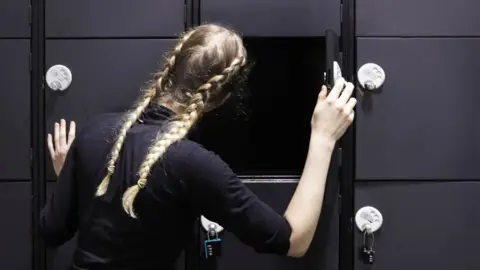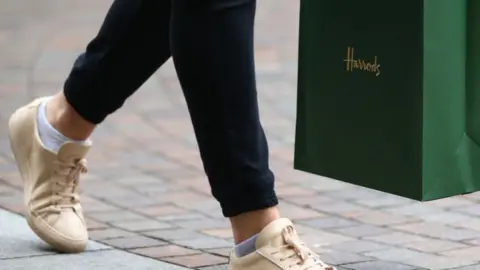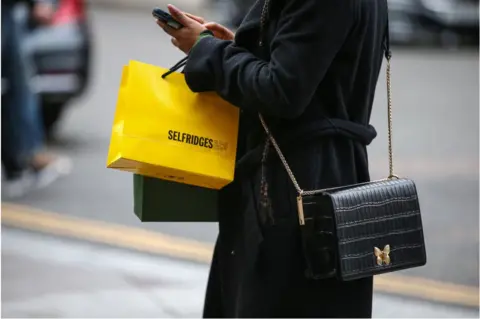How is a thief taking thousands from London gym-goers?
 Getty Images
Getty ImagesA serial thief is targeting London gym-goers and emptying their bank accounts, a BBC Radio 4 investigation has found.
Journalist Shari Vahl from the You and Yours programme has spoken to a number of women with near-identical experiences - all of which included the loss of many thousands of pounds.
Vahl shared her findings with the Met Police, which had previously closed a number of individual investigations, to show the cases could be linked.
Now the force will reopen the inquiry.
What happens?
The similarities in each of the cases appear striking - female victims who have put their belongings in a locker in a popular chain of gyms, only to return and discover their phones and cards have been taken. A number of high-value purchases have been made, at the same shops. The thief also treats themselves to a fast-food meal.
One victim, Alina, had her items stolen from a Virgin gym in Finchley Road last month. The thief spent about £10,000 in Harrods, and the Covent Garden Apple store. They tried to spend another £10,000 after Alina had blocked her cards. They used her money for food and taxis and withdrew cash from ATMs and changed the access to her accounts.
The same shops come up time and again.
Harriet had her locker raided at a GymBox in the city. Within 90 minutes, some £7,500 had been spent in Selfridges, Apple, Balenciaga, and Harrods.
Charlotte had £8,000 of her money spent while she was exercising at a gym in Chiswick, after the thief had transferred her savings into her current account and gone shopping in Oxford Street.
Alicia and a fellow gym-goer experienced the same thing, with her money spent at the same high-end shops. Lauren had her account emptied while she was swimming in Putney. Kirsty was targeted at a gym in Mill Hill, and Miriam in Notting Hill.
 Getty Images
Getty ImagesHow is it done and who is doing it?
Phones, of course, can be made inaccessible with the use of passwords and face or fingerprint unlocking. And bank cards can be stopped.
But the thief has a method which circumnavigates those basic safety protocols.
Once they have the phone and the card, they register the card on the relevant bank's app on their own phone or computer. Since it is the first time that card will have been used on the new device, a one-off security passcode is demanded.
That verification passcode is sent by the bank to the stolen phone. The code flashes up on the locked screen of the stolen phone, leaving the thief to tap it into their own device. Once accepted, they have control of the bank account. They can transfer money or buy goods, or change access to the account.
It is possible the perpetrator is female and operating alone.
The entry method indicates it's someone who can walk without raising suspicion into the women's locker rooms.
The shops are the same every time.
It appears the thief has a system and is adept at using it.

Protect yourself

The most effective solution is also, for many, the least feasible: go to the gym with no valuables.
Vahl says the most important tip is to never leave your phone and card together, "and certainly never keep your card in your phone case". If the thief does not have both, they are limited as to what they can do.
Other than that, the best way to stop this particular thief and this particular method is to make sure they cannot read the verification code sent by the bank. This is done in your phone's settings:
For iPhones:
- Go to Settings
- Scroll to Messages
- Scroll to Notifications
- Scroll to Show Previews where there are three choices: Always / When Unlocked / Never
- Select either When Unlocked or Never. Your messages will no longer flash up when your phone is locked
For Android:
- Go to Settings
- Select Lock Screen
- Select Notifications
- Select Don't Show Notifications. Your messages will no longer flash up when your phone is locked

 Getty Images
Getty ImagesAccess and identification
Getting into gyms across the capital can be pretty simple. Most chains, including Virgin Active, PureGym and GymBox, have membership options where the holder can use one pass for multiple premises. Any would-be thief could become a member and waltz in to any locker room with no trouble at all. There is not someone on the door to reference the face or name of the passholder.
Shari Vahl said she is aware that gym passes are highly prized by criminals, who use stolen ones to access locker rooms.
For example, the anonymity provided by a 24-hour gym could be a good place to put illegal items in a locker, which can then be picked up by someone else.
Once a person is in the locker room, they do not have to be particularly cautious.
Mike Salt is an independent locksmith and security expert. As he points out, the gym will undoubtedly have security cameras but because of restrictions due to privacy, they will not be at the scene of the crime - a changing room.
 Getty Images
Getty ImagesAnother issue is that people in locker rooms are, for the most part, not very vigilant, Mr Smith said.
"Often, they are in fact taking precautions to be unobservant to give privacy to people as they change clothing or wander around in various states of undress. Few people are staying in the locker rooms long enough to notice people milling about, and people struggling to open their locks is a relatively normal sight. Those that do mill about are also not that unusual, as some people treat the gym as more of a social club than a place for exercise.
"With heavy foot traffic, it is hard to tell who does not belong. With a location like a gym, you are also dealing with a diverse crowd. Everyone there is at different levels of fitness. And the outfit that you need to wear in order to blend in is also very simple.
"As long as someone is not wearing jeans or slacks, chances are people will think they have a right to be there. Most people are strangers you wouldn't recognise, so gym patrons take the default position of assuming everyone around them is there legitimately."
 Getty Images
Getty ImagesTargets
A notable feature of the recent spate of victims is that they have had enough money in their accounts for the thief to spend significant amounts.
Mr Salt said thieves had a number of ways of selecting their targets.
A criminal might spot someone such as a woman who has expensive jewellery she removes to work out. Valuable goods and a regular routine are attractive to this type of thief.
"Criminals like this just lay in wait until the moment is right. They are patient and often take the time to gather the proper materials to execute the theft with greater precision. The more you have, the more prepared criminals will be when they come to take it."
As for getting into a gym locker, Mr Salt said the most likely way was with a shim - a slim metal device that can be inserted into a lock, popping it open.
 Getty Images
Getty ImagesWhat to do if you are a victim
Tell your bank straight away.
Most banks will refund money stolen by fraud, if they cannot prove you were somehow negligent - by, for example, writing your passcode down.
Of the women featured at the beginning of this article, Alina said: "I suffer from generalised anxiety and insomnia, along with migraines. The way this incident was handled by the police and card companies for investigation has caused me a lot of stress and had a detrimental effect to my mental health."
Harriet said: "I was lucky enough to get all of the money back relatively quickly but unfortunately I had a brand-new phone (three days old) which I hadn't insured yet so I lost £800 from that."
Alicia said: "The only reason Halifax believed I hadn't written down my Pin was because the thief moved money between my accounts while I was on the phone to the bank. Fortunately, the other woman also banked with Halifax so we combined our reports."
Charlotte had to fight to get her money back. Her bank eventually conceded she was not at fault, refunded her and apologised.
What are the police doing?
A Met spokesperson said: "We have been made aware of a number of similar offences in which property has been stolen from gym lockers and bank cards then used to make fraudulent purchases.
"Each offence is now being reassessed and, where appropriate, these will be investigated as part of a linked series.
"The victims in each case will be contacted by officers and provided with updates as the investigation progresses."
Follow BBC London on Facebook, Twitter and Instagram. Send your story ideas to [email protected]
